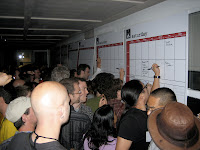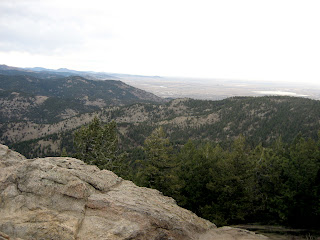These are my notes from a startup pitch session paneled by Michael Arrington of Tech Crunch and Paul Kedrosky, Josh Kopelman, Julie Hanna Farris. All of the companies at least had early stage funding and were given about 5 minutes to present each, sort of startup speed dating :)
CompaniesAdap.tv
trying to match online video to advertisers. over 1M ads currently Contextually analyzes video, audio, and metadata. Monitors users interaction with the ads and adapts to their prefs.
Pretty cool. continuously analyzes stream and finds most relevant ad in their ad database.
Adaptive Blue
Semantic web company. People + shortcuts = getting to info faster, also personalized web. Browser add-on -> blue organizer = Personalized Smart Browser. "i'd like to" menu shows contextual intent related actions. Can highlight text, tell the organizer that it is a book, then shows shortcuts to buy the book or see a book review. Has a trademarked piece called "Smart Links" that shows these contextually related links.
Aggregate Knowledge
Six months ago launched at demo conference. Powering discovery for 50M users per month. Discovery happens in offline world all the time. how do you discover online. finding serendipitous piece of content. creating better navigation metaphor for answers.com. Implicit affinity matching on a massive scale. worlds largest implicit social network.
Cast.tv
Video search. Matching users with content they would be interested in. Compared directly to Google. Searches across the web, unbiased compared to Google (why is google biased?) Has generated fan landing pages for all major shows (thousands and thousands of shows).
- crawling and indexing - prop technology to build a better index. gemstar is a customer uses to automatically generate a tv guide
- relevancy - something better than google. blah blah blah.
Tried to get on their site but it said was undergoing some improvements. Pretty lame.
funded by DFJ
Critical Metrics
Music discovery recommendation and search field. lots of competitors. why would they come into this field at this late stage. no matter how much you use the services, they won't keep you up to date with NEW music. Why? because it's pretty much impossible. There's too much music that comes out. Each day there are about 1000 songs. Is a recommendation engine that ploughs through all the music.
Jangl
phone talking company. communications through your social network. Phone is not currently attached. Phone is not part of the profile because of privacy issues. They handle privacy issues. Sends email with voice message to user. Can put a widget up on your page that allows readers to call you. You then permission people as to whether those calls go through.
pando networks
peer assisted media delivery. Cuts cost of deliver a 1G media file from $200,000 to $5000. Currently serving 8.5 million clients delivering 70TB per day.
SodaHead
Just came out 2 months ago. Old school polling with web2.0 social. Can do a lot more now, share poll with friends, comment on poll, answer with video, pictures, etc. Capture aggregate data with individual commentary
Spock
people search engine. Looks pretty cool. Put in blogger, returned Michael Arrington, clicked on related term "Tech Blogger" and Tim O'Reilly came up first. Will need to check it out more. Uses user tagging to build relationships between people and concepts. Good presentation.
Wize
Online product research is still too hard. Hard to help father buy computer. normalizes rating systems across all the prod research sites. Created product sentiment database from user reviews, bloggers, expert opinions, market buzz, and manufacturers sites. WizeRank - consumer report for the future. Aim is to create a true product satisfaction score. Starting syndication relationships now. Should talk to this guy.
ZapMeals
The shortest distance between great food and your tummy. online meal order and delivery service. ebay for takeout.
ZenZui
Cosumer centric services, + power of sync + focus on design. MS research background. "Adaptive and scalable UI" 16 tile customizable views of what's important to you on your mobile device. Updates by polling with any new info, basically a 2 dimensional widget space on your phone. can nav and then zoom in on tiles. viral spread of widgets by monitoring widget heat.
Zing
Untether online services (such as last.fm) so you can access and use from your phone.
13 companies presented, 1 was fake. got to vote via Soda which one was fake. Definitely ZapMeals. I must have missed a couple there. oh well.
Panel FeedbackKedrosky - interesting that there were no wiki mentions, no ajax this year. Lot's of competitors to google but loathe to mention google name (awaken the monster). nature of demographics on web have changed so much in the last 5 years. Much has moved to entertainment sites and bloggers. Which companies appeal to innate laziness. Likes Cast.tv. Big unsolved problems attract big buyers. Monetizing video traffic is such a big problem, esp. with creating live overlays. Consumer related search technologies must painfully avoid Google or will just become another tab in google (without consent or payout).
Arrington - new phone apps are exciting, perhaps driven by iphone functionality and screen real estate. touch screens are fascinating. not easy to impress with just a web application. Likes Cast.tv. Adap.tv just acquired by AOL. he thinks Cast.tv is better. Better video search is hot.
Julie Hanna - Bias against companies wanting to be destinations sites. Jangl brings two common forms of communication and blends them together.
OverallDoesn't feel like a bubble. Not enough froth out there. Need more people out the other side getting rich to create a bubble. Lot of companies in tweener stage. Easy to get early stage money, not so easy to get to the next round. Seed stage is used to validate or improve hypothesis. iPhone may be the catalyst for the next rich ecosystem for startups out there.























